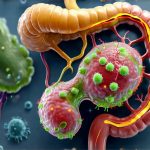Irritable Bowel Syndrome (IBS) is a common gastrointestinal disorder affecting millions worldwide, characterized by abdominal pain, bloating, gas, diarrhea, and/or constipation. While its exact cause remains elusive, it’s increasingly understood that the interplay between gut microbiota, diet, brain-gut axis, and immune function plays a significant role in symptom development and severity. Emerging research highlights the crucial influence of short-chain fatty acids (SCFAs), produced by bacterial fermentation in the colon, on IBS pathophysiology and potential management strategies.
The complexity of IBS necessitates exploring all avenues of understanding its underlying mechanisms. SCFAs represent a fascinating area of investigation, offering a tangible link between dietary choices, gut microbial activity, and overall gut health. This article will delve into the role of these important metabolites, examining their production, functions, and implications for individuals experiencing IBS symptoms.
What are Short-Chain Fatty Acids?
Short-chain fatty acids (SCFAs) are organic acids produced when bacteria ferment undigested carbohydrates in the large intestine. The primary SCFAs include acetate, propionate, and butyrate, each possessing distinct properties and functions within the body. Fiber from fruits, vegetables, and whole grains serves as a key substrate for this fermentation process, highlighting the importance of dietary fiber intake.
These compounds aren’t merely waste products; they are vital signaling molecules with wide-ranging effects on gut health, immune regulation, and even systemic metabolism. Their production is directly tied to the composition and diversity of the gut microbiome – a healthy, diverse microbiome generally leads to greater SCFA production.
The Impact of SCFAs on IBS
The connection between SCFAs and IBS is multifaceted. Imbalances in SCFA production have been observed in individuals with IBS compared to those without. Specifically, alterations in the relative abundance of different SCFAs, as well as overall reduced SCFA levels, can contribute to symptom presentation. While not a cure-all, understanding how these metabolites interact with the gut environment offers potential avenues for targeted interventions.
Butyrate and Gut Barrier Integrity
Butyrate is perhaps the most extensively studied SCFA in relation to gut health. It’s the primary energy source for colonocytes – the cells lining the colon – supporting their function and maintaining a healthy gut barrier. A compromised gut barrier, often referred to as “leaky gut,” allows undigested food particles and bacteria to cross into the bloodstream, potentially triggering inflammation and exacerbating IBS symptoms. Butyrate strengthens tight junctions between these cells, bolstering barrier integrity and reducing permeability. In IBS, altered butyrate production may contribute to increased intestinal permeability and heightened sensitivity.
Furthermore, butyrate possesses anti-inflammatory properties, helping to modulate immune responses within the gut. Chronic low-grade inflammation is a hallmark of many IBS cases, and enhancing butyrate levels through dietary or supplemental means might help dampen this inflammatory state. Studies have shown varying butyrate production in different IBS subtypes; for example, those with diarrhea-predominant IBS (IBS-D) may exhibit lower butyrate levels compared to healthy controls.
Acetate and Propionate: Beyond Energy Production
While butyrate is often the focus, acetate and propionate also play crucial roles. Acetate influences gut motility – the movement of food through the digestive tract – and can affect visceral sensitivity, potentially impacting pain perception in IBS. Altered motility is a common feature of IBS, contributing to symptoms like diarrhea or constipation. Propionate has systemic metabolic effects, influencing glucose homeostasis and lipid metabolism, but its direct role in IBS pathophysiology is still being investigated.
Importantly, the balance between these three SCFAs seems critical. Disruptions in this balance can influence gut function and contribute to symptom variability. For instance, an excess of acetate relative to butyrate might worsen diarrhea, while a deficiency in butyrate could compromise barrier function. The interplay between these compounds is complex and requires further research to fully elucidate.
Dietary Strategies to Enhance SCFA Production
Increasing dietary fiber intake is the cornerstone of enhancing SCFA production. Foods rich in prebiotic fibers – such as onions, garlic, leeks, asparagus, bananas, oats, and apples – provide fuel for beneficial bacteria that produce SCFAs. A gradual increase in fiber consumption is recommended to avoid exacerbating bloating or gas, common IBS symptoms.
Resistant starch, found in cooked and cooled potatoes, rice, and legumes, also promotes SCFA production. Fermented foods like yogurt (with live cultures), kefir, sauerkraut, and kimchi introduce beneficial bacteria into the gut, potentially boosting SCFA synthesis. It’s important to note that individual responses to dietary changes vary significantly; what works for one person might not work for another. Working with a registered dietitian or healthcare professional can help tailor dietary strategies based on specific IBS subtypes and sensitivities.
Ultimately, understanding the role of SCFAs in IBS is an evolving field. While more research is needed to fully unravel their complex interactions within the gut ecosystem, it’s clear that these metabolites are central to maintaining gut health and potentially alleviating IBS symptoms. A diet rich in fiber, coupled with strategies to foster a diverse and thriving gut microbiome, represents a promising approach to supporting SCFA production and improving overall gastrointestinal well-being.


















